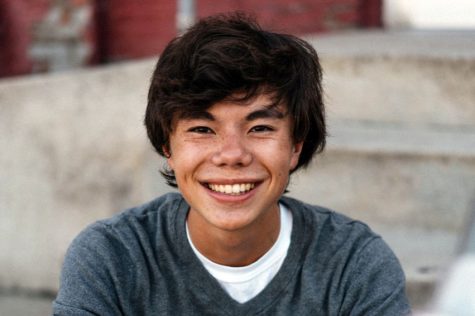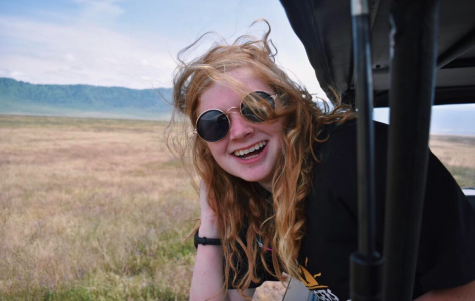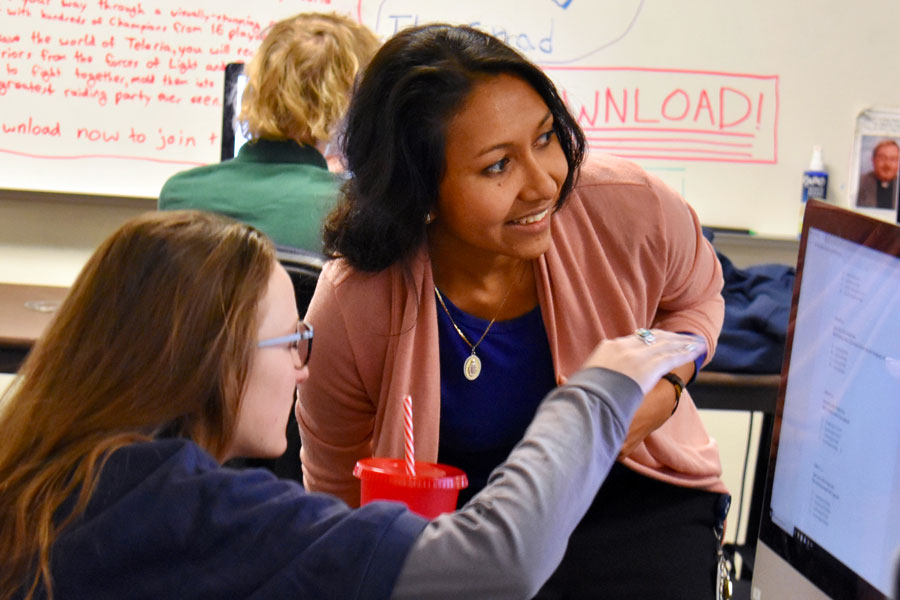AP Computer Science program earns recognition
Instructor provides key to increasing female enrollment
Ms. Ria Pereira assists a student in her E period class on Feb. 17.
The future holds exciting promise. Advances in medicine, space travel, technology and await in the coming decades. All of these components of a shining future rest on a single unifier: computer science.
For a substantial increase in enrollment by girls, the school has earned the College Board’s AP Computer Science Female Diversity Award. Miss Ria Pereira instructs computer science and coding classes, and in doing so is changing prior notions of the typically male dominated industry.
Pereira’s own experience enables her to empower other students. She explained that in Kuwait, where she attended a high school with an Indian syllabus, students were not granted the same kind of flexibility in class choices until their junior year. When the time came, a student had a choice of four tracks. Pereira said that she didn’t have an interest in commerce or the medical field, and so she entered into the computer/math track.
“I loved it,” said Pereira. For the next two years, Pereira learned the computer language C++ under a person she called “a great teacher” who reaffirmed her track of choice. For university, Pereira said, “I knew I didn’t want to let go of computer science,” so she chose to major in electrical engineering, where she could apply her computer science knowledge to circuits.
Later, Pereira would work as a software engineer as an international student in the United States. “It was a good job, but I knew it wasn’t what I wanted to do,” said Pereira.
Pereira said “God led me,” and she turned toward education. Cathedral was the only school she applied to. Pereira said initially it was much different from anything she had done before, particularly because she had studied with more of an engineer’s perspective than a teacher’s mindset.
Today, Pereira has come to teach an array of classes, from beginner level Visual Basic to more intermediate classes, such as AP Computer Science A. AP Computer Science Principles (APCSP), the class that earned the school the award under Pereira’s guidance, is designed “so that a freshmen could take it,” said Pereira.
One freshman does take it, Jade Zhou. “You learn to create and include sources into code, learn algorithms and debug solutions, plus many other tasks. Basically, (APCSP) gives students a better understanding of practices and data,” Zhou said.
As a class without any coding or computer science prerequisites, APCSP provides an excellent display of the potential of computer science. Students learn about image sharing and encoding, data encryption, the behind the scenes mechanisms of the Internet, and a bit of code. Pereira said the information can be applied to all kinds of industries, from commerce to fashion. Having a background in computer science can help streamline a process and enhance a work experience overall, she said.
Pereira said that in the first two years of teaching APCSP, she had never instructed some of the students before. “Most of them were seniors who wanted some kind of knowledge in computer science before they graduated,” said Pereira. In the 2017-2018 school year, the class was split equally by gender, and Pereira said that in the 2018-2019 school year (which also had a nearly 50/50 split), some of the things that female students created just “blew me away.”
As one of their projects, students split up into groups to make a computer-drawn image. A team of four girls decided that they wanted to recreate the ball drop from New Year’s Eve. Pereira said, “Even though they had never coded before, they did so well.” The scene displays a crowd of people, buildings draped in banners, flashing fireworks, and of course, the dropping ball.
Pereira pointed out that this was an example of how introducing more female students into the realm of computer science can invite more creativity. She also cited junior Madison Ackley’s project in Java class, an online shopping calculator. Pereira said that some of the projects created by female students break from the ones of the often male dominant classes she teaches.
Ackley said, “This class was really outside my comfort zone, but I took it and I’m glad I did because it’s more than just math. It’s so much more interesting. Computer programming I was really more like art.”
Junior Lauren Dubbink, who also took Computer Programming I and is currently enrolled in Java, said, “I signed up because I think it’s good for anyone to learn a language. If I want to go into engineering because the future is in programming. The exposure is really important.”
Dubbink said that she plans to take AP Computer Science A as a senior, and is “slightly apprehensive but excited to get more experience coding.”
Both students emphasized Pereira’s incredible patience. “She cares about her students so, so much,” said Ackley.
Dubbink added, “She’s always handling like 25 kids who all need her attention and help constantly.”
As female computer science students, the pair said that to encourage enrollment, it starts with current students to encourage their friends to take it. Other initiatives, like early introduction during middle school, can sow seeds of interest for later study in high school or college.
Junior Bill Zhang, an AP Computer Science A student, said, “It’s definitely great” to see an increased in female enrollment in computer science and coding classes. Zhang said, “I know it’s usually guys who are interested in coding, but that definitely doesn’t mean girls are worse at coding. I think everyone should try it.” Zhang also said, “Miss Pereira is very valuable. Aside from just teaching people to code, she wants us to be good at it, and to get good grades.”
As an experienced female computer science teacher, Pereira is in a position to use her own experience as a means to display to other female students who are even remotely curious about computer science or coding. She said, “I worked on a team being the only lady on sight, but it was still a good work culture.” There was always the expectation among the team that they all had the same kind of education and essentially the same knowledge.
Pereira said, “There’s totally a place for women, and (computer) science can get so interesting that I want to encourage female students to check it out.”

Andrew de las Alas is a senior and reporter for the Megaphone. He runs varsity cross-country, is co-captain of the speech and debate team and co-president...

Gracie Carr is a senior and a photographer for newspaper and yearbook. She is a member of Student Council, Riley Dance Marathon, National Honor Society...







